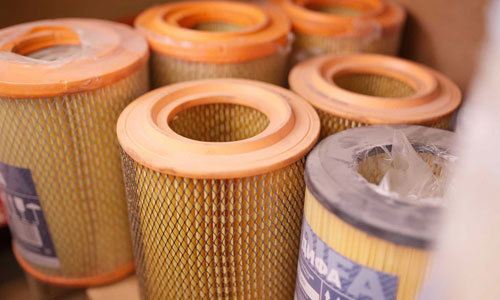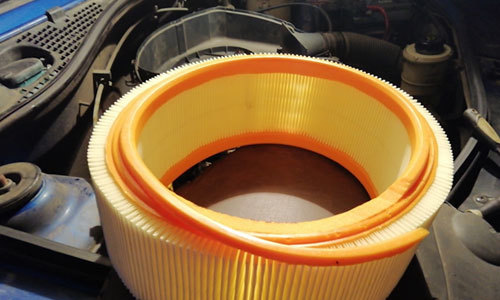How to Choose the Right Cylindrical Air Filter for Your Equipment: A Comprehensive Guide
2025-09-17
How to Choose the Right Cylindrical Air Filter for Your Equipment
Table of Contents
Understanding Air Filters: An Overview
The Importance of Air Filters in Equipment Performance
Types of Cylindrical Air Filters: Which One Is Right for You?
Key Factors to Consider When Choosing a Cylindrical Air Filter
Filter Materials and Their Impact on Performance
Understanding Filter Efficiency and
How to Choose the Right Cylindrical Air Filter for Your Equipment
Table of Contents
- Understanding Air Filters: An Overview
- The Importance of Air Filters in Equipment Performance
- Types of Cylindrical Air Filters: Which One Is Right for You?
- Key Factors to Consider When Choosing a Cylindrical Air Filter
- Filter Materials and Their Impact on Performance
- Understanding Filter Efficiency and Rating Systems
- Maintenance and Replacement Intervals: Keeping Your Equipment Running Smoothly
- Common Mistakes to Avoid When Choosing Air Filters
- Frequently Asked Questions (FAQs)
Understanding Air Filters: An Overview
Air filters play a crucial role in maintaining the efficiency and longevity of various types of equipment. Whether used in automobiles, industrial machinery, or HVAC systems, **cylindrical air filters** are designed to trap contaminants and prevent them from entering sensitive components. This article guides you through the process of selecting the right filter for your specific needs.
The Importance of Air Filters in Equipment Performance
Air filters are often overlooked, yet they are vital for optimal equipment performance. They serve as the first line of defense against dirt, dust, pollen, and other airborne pollutants that can lead to:
- **Reduced Efficiency**: Clogged filters can restrict airflow, leading to inefficient operation and increased energy consumption.
- **Equipment Damage**: Contaminants can damage internal components, resulting in costly repairs and downtime.
- **Decreased Lifespan**: Regular use of high-quality air filters can extend the lifespan of your equipment, ultimately saving you money.
Choosing the right **cylindrical air filter** not only enhances performance but also contributes to greater environmental sustainability through improved fuel efficiency and reduced emissions.
Types of Cylindrical Air Filters: Which One Is Right for You?
Cylindrical air filters come in various types, each suited for specific applications. Understanding these types will help you make an informed choice:
1. Paper Air Filters
Paper filters are the most common type, known for their affordability and efficiency in trapping dust and debris. However, they have limited durability and need frequent replacement.
2. Foam Air Filters
Foam filters are made from porous materials that provide excellent filtration and are reusable after cleaning. They are ideal for off-road vehicles and equipment operating in dusty environments.
3. Synthetic Air Filters
Synthetic filters offer high filtration efficiency and durability. They can withstand higher temperatures and are resistant to moisture, making them suitable for a wider range of applications.
4. HEPA Filters
High-Efficiency Particulate Air (HEPA) filters are designed to capture microscopic particles, making them ideal for environments that require high levels of air quality, such as hospitals and clean rooms.
Key Factors to Consider When Choosing a Cylindrical Air Filter
When selecting a cylindrical air filter, several factors should guide your decision:
1. Compatibility with Equipment
Ensure that the filter you choose is compatible with your equipment's specifications. Consult the manufacturer’s guidelines to determine the correct dimensions and filtration efficiency required.
2. Application Environment
Consider where the equipment will operate. For instance, equipment used in highly dusty environments may require filters with higher dirt-holding capacities and more robust materials.
3. Filtration Efficiency
Look for filters with high filtration efficiencies. This can be indicated by the MERV (Minimum Efficiency Reporting Value) rating, which ranks filters based on their ability to capture particles of different sizes.
4. Cost vs. Value
While it might be tempting to choose the cheapest option, consider the filter's lifespan and performance. A higher-quality filter may have a higher upfront cost but can save you money in the long run through reduced maintenance and replacement needs.
Filter Materials and Their Impact on Performance
The material used in the construction of air filters significantly affects their performance and longevity. Here’s a breakdown of common materials:
1. Paper
Paper filters are effective for standard applications, but their filtration efficiency diminishes when exposed to moisture. They are ideal for environments with less exposure to harsh conditions.
2. Foam
Foam filters provide excellent airflow and can be washed and reused. They are great for off-road vehicles or equipment used in rugged conditions.
3. Synthetic
Synthetic materials offer the best balance of filtration efficiency and durability. They perform well in high-temperature applications and maintain their integrity longer than paper or foam.
4. Carbon-Activated Filters
These filters contain activated carbon that absorbs odors and harmful gases in addition to filtering particulates. They are commonly used in HVAC systems and environments requiring enhanced air quality.
Understanding Filter Efficiency and Rating Systems
To select the right cylindrical air filter, it’s essential to understand the various efficiency and rating systems:
MERV Rating
The MERV rating system ranges from 1 to 16, with higher numbers indicating better filtration capabilities. Filters rated between 8 and 12 are suitable for residential use, while those rated 13 and above are ideal for commercial applications.
HEPA Certification
A HEPA filter must meet strict efficiency standards, capturing 99.97% of particles that are 0.3 microns or larger. This certification is crucial for applications requiring high air quality, such as medical environments.
Maintenance and Replacement Intervals: Keeping Your Equipment Running Smoothly
Regular maintenance and timely replacement of air filters are essential for optimal equipment performance. Here are key recommendations:
1. Regular Inspections
Conduct routine checks of your air filters to assess their condition. Look for visible dirt or damage, and consider replacing filters that are discolored or clogged.
2. Replacement Intervals
Replacement intervals depend on the filter type and application. Generally, paper filters should be replaced every 3 months, while foam and synthetic filters can last up to 6 months or longer with proper cleaning.
3. Environmental Considerations
In dusty or polluted environments, filters will need more frequent replacements. Adjust your maintenance schedule based on operational conditions to ensure peak performance.
Common Mistakes to Avoid When Choosing Air Filters
Selecting the wrong air filter can lead to various issues. Here are common pitfalls to avoid:
1. Ignoring Manufacturer Recommendations
Always consult the manufacturer's specifications for your equipment. Using an incompatible filter can cause damage and void warranties.
2. Overlooking Airflow Requirements
Filters with too high a MERV rating can restrict airflow, negatively impacting equipment performance. Balance filtration efficiency with airflow requirements.
3. Neglecting Regular Maintenance
Failing to inspect and replace filters regularly can lead to equipment inefficiency and potential breakdowns. Establish a maintenance routine to avoid these issues.
Frequently Asked Questions (FAQs)
1. How often should I replace my cylindrical air filter?
Replacement frequency depends on the type of filter and operating conditions. Generally, paper filters should be replaced every 3 months, while foam and synthetic can last longer with proper maintenance.
2. What is the ideal MERV rating for residential air filters?
For residential use, filters with a MERV rating between 8 and 12 are typically sufficient, balancing filtration efficiency with airflow.
3. Can I wash and reuse my air filter?
Foam and some synthetic filters can be washed and reused, while paper filters are usually disposable and should not be washed.
4. What is the difference between HEPA and standard filters?
HEPA filters capture 99.97% of particles that are 0.3 microns or larger, making them ideal for environments requiring high air quality, while standard filters have lower filtration efficiency.
5. How do I know if my air filter is clogged?
Signs of a clogged air filter include reduced airflow, unusual noises from the equipment, and visible dirt or discoloration on the filter itself.
Conclusion
Choosing the right cylindrical air filter for your equipment is crucial for maintaining optimal performance and prolonging its lifespan. By understanding the different types of filters, their materials, efficiency ratings, and maintenance needs, you can make an informed decision that enhances your equipment's performance. Avoid common mistakes and adhere to manufacturer recommendations to ensure your equipment runs smoothly and efficiently, ultimately saving you time and money.
Key words:
Related News
How often does the air filter change?
The air filter element is mainly used to block impurities such as dust and sand in the air.
2024-05-22
What are the car filters? When do car filters need maintenance?
As an oil filter, it is generally replaced together with the oil during maintenance.
2024-05-22
The choice of filter manufacturers should be considered comprehensively
Before choosing a filter manufacturer, you must understand the relevant background of the manufacturer.
2024-05-22










